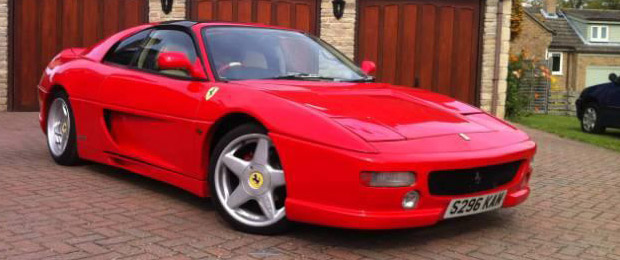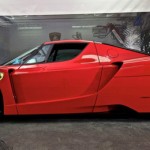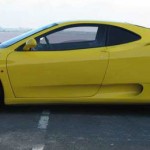 When Ferrari introduced the 355, technically the F355, in 1994, it has something to prove. Product planning had it as the successor to the 348 and it would have been if something funny hadn’t happened in between, a small Japanese automaker came out with a real Ferrari-killer, the NSX. Oh, in case you hadn’t guessed the automaker was Honda.
When Ferrari introduced the 355, technically the F355, in 1994, it has something to prove. Product planning had it as the successor to the 348 and it would have been if something funny hadn’t happened in between, a small Japanese automaker came out with a real Ferrari-killer, the NSX. Oh, in case you hadn’t guessed the automaker was Honda.
The NSX was everything the Ferrari street car was supposed to be but wasn’t. The NSX, which had ground clearance, it seemed, of about an inch, was a tough-riding car, but it was also a tough-handler.
It was not built for the faint of heart of or kidney. Indeed, those who drove it back then wondered if kidney belts were going to be offered as options as it pulled high-Gs when running in circles and could straighten out about any corner except a 90-degree angle.
The six-speed shifter (one of the first on the market) was a dream and the engine, which loved to scream near the redline, had more than enough punch to get a driver’s license in jeopardy with the local police, if they happened to cross paths. The NSX did a 4-second 0 to 60 – not bad from a 3.5-liter mid-engined V-6 with the right gearing – and did a 9-second quarter with an exit speed of about 102.
Modena was not ready for that, most assuredly, and the F348, just wasn’t the car to handle the NSX. The F355 was not an easy pill for Modena. It was used to having things its own way and when the 348 fizzled because the technology just wasn’t up to it, Ferrari went overseas and for the first time used imported (Japanese) starter motors, generators. Finally, the automaker had to suffer the mortifying experience of going to Bosch (German) for its engine management system.
This was not a happy time to be a Ferrarista, but it was also a necessary time. It showed the company could adapt. It also showed the firm did know how to do some things well, such as the Formula One paddle shifter (the two paddles just behind the steering wheel). It was quite a leap forward and showed that Modena could be humble when it wanted something and it did – it wanted mastery of the road car world again and against all odds and with a lot of engineering time, the did it with the F355. This was no car for kiddies. It was powered by a 3.5-liter 5-valve V-8 that cranked out 375 horsepower and was actually a bored and stroked version of the 3.4L in the 348.
That Ferrari was serious with the F355 is easy to see that it changed from a four-valve setup to a five-valve engine that was free-breathing and gave new life to a venerable line. No, it wasn’t entirely Ferrari, but it was still a Ferrari and the F355, available as a coupe and a spyder (removable roof), was the parent of the F360 Berlinetta.
If there is one industry the Ferrari F355 has spawned it is the replica industry. Where else can someone take a very humble Toyota MR-2 frame and rework it a bit – or have it reworked a bit – and, depending on the quality of the work or the frame – have it look like the sleek, low-slung F355.
Perhaps that’s the allure of have an F355 replica – having people thinking you are driving a Ferrari for about a-third the price, if the job is done right. If the job isn’t done right, you’ll have a vehicle that will have body panels that seem to be going their own way, rather than having body panels that line up with very little space between them.
That’s the key to a replica F355. Ensuring that the work is done correctly by a professional, unless you feel you have the skills, the tools and the space, plus vice grips and clamps to do the job correctly. Also, you have to feel comfortable inserting any spacers that might be needed for the bumper or wheels.
Interestingly, the two base vehicles that people like to use for the replicas is either the 1995-2004 Toyota MR-2 or the 1984-89 Pontiac Fiero. Indeed, the Fiero with its five-speed transxle and its engine is preferred by many builders because it is closer to the original than the Toyota. Fortunately, there were more than 350,000 Fieros built during its product run, although you will find that not all Fiero frames are created the same. If the frame looks like it has been through a small battle in Iraq, you’re likely to get a very inexpensive frame, but then you’ll have to spend thousands to bring it up to specs. However, many Fieros have been maintained well and if you find a good frame, aside from the fact you may spend up to $35,000 for the frame, you’ll also have to find the right kit.
Here are some kit makers:
HYPERLINK “http://www.extreme-sportscars.com/”www.extreme-sportscars.com
HYPERLINK “http://www.mr355.com/”www.mr355.com
HYPERLINK “http://www.pistonheads.com/”www.pistonheads.com
Image: cageymedia.com

























Leave a Reply
You must be logged in to post a comment.